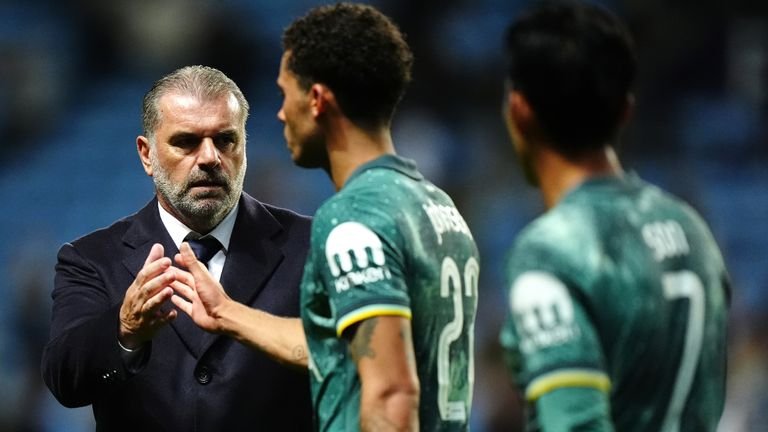Champions League Fixed Matches
Champions League Fixed Matches
Football Tips 1×2
Day: Thursday Date: 19.09.2024
First Match: Feyenoord – Bayer Leverkusen | Tip: X2 | Odds: 1.20 | Result: 0:4 | LINK | WON
Second Match: Atl. Madrid – RB Leipzig | Tip: 1X | Odds: 1.20 | Result: 2:1 | LINK | WON
Third Match: Monaco – Barcelona | Tip: X2 | Odds: 1.20 | Result: 1:2 | LINK | Lose
E-mail support: fixedmatchgloball@gmail.com
WhatsApp support: +1 (508) 939-3661
Username for Telegram: @fmatchglobal
Early Life and Passion for Football
Jorge Nuno Pinto da Costa, born on December 28, 1937, in Cedofeita, Porto, grew up surrounded by football’s influence. From a very young age, he demonstrated a natural love for the sport. His family nurtured this passion, and football became a significant part of his childhood. He would often spend long hours watching local football matches, fascinated by the game’s dynamics and tactics. Even as a child, Pinto da Costa showed a keen interest in the management and strategy side of sports. Unlike many of his peers, who focused on playing, he was more intrigued by how teams operated off the field. His early years laid the foundation for a career that would ultimately change the course of Portuguese football forever. Win big with Champions League Fixed Matches, your key to success in Europe’s top competition.
The Beginning of His Journey with FC Porto
Pinto da Costa’s formal journey with FC Porto began in the 1960s when he took on a modest role within the club’s basketball department. Although basketball was far from his primary passion, it gave him an invaluable insight into the internal workings of a sports club. During these early years, Pinto da Costa proved to be diligent and dedicated, quickly gaining the respect of his peers. His tireless work ethic, combined with his deep love for football, soon caught the attention of those in the upper ranks of FC Porto. Though his role in the basketball section did not bring him directly into football management, it allowed him to develop connections within the club. Over time, his ambitions grew as he learned more about what it took to lead a successful sports organization.

Stepping into Football Administration
By the 1970s, Pinto da Costa had shifted his focus entirely to football. His rise in FC Porto’s football department came at a critical time for the club. Porto had fallen behind its fierce rivals, Benfica and Sporting CP, and Pinto da Costa sought to change this. His strategic mind quickly became apparent, as he implemented innovative approaches to management and team building. His vision extended beyond just winning matches; he wanted to build a legacy for the club. This ambition led him to pursue roles of greater responsibility within the football division, where he could start to make real changes. Pinto da Costa understood that for Porto to compete at the highest levels, it needed more than just good players. It required a complete overhaul in terms of organization, structure, and long-term planning. Maximize your profits today with accurate Champions League Fixed Matches predictions.
Presidential Campaign and Victory
Also 1982, Pinto da Costa ran for the presidency of FC Porto. The club was in desperate need of strong leadership, having struggled both domestically and internationally. Pinto da Costa’s campaign promised significant change and a clear vision for Porto’s future. His determination and persuasive ideas won over the club’s supporters, and he was elected as president. Immediately upon taking office, he set about transforming every aspect of FC Porto’s operations. His first task was to professionalize the club, ensuring that every department, from youth development to marketing, operated at the highest level. Pinto da Costa’s election marked the beginning of a new era for FC Porto, as he started laying the groundwork for what would become a football empire.
Building a Winning Mentality
One of the first changes Pinto da Costa implemented was cultivating a winning mentality within the club. He believed that for FC Porto to compete with the giants of Portuguese football, the players and staff had to embrace a new attitude. Losing could no longer be acceptable, and every match had to be approached with the mindset of champions. To instill this belief, Pinto da Costa made strategic decisions in both the coaching staff and player acquisitions. He sought out individuals who shared his vision for success and were willing to work tirelessly to achieve it. This new philosophy gradually started to take root within the club, as players began to adopt a more professional and competitive approach to every game they played.
Hiring José Maria Pedroto
Pinto da Costa’s presidency reached a pivotal moment when he appointed José Maria Pedroto as the club’s head coach. Pedroto shared Pinto da Costa’s ambitious vision for FC Porto and was known for his tactical genius. Together, they set about rebuilding the team from the ground up. Pinto da Costa gave Pedroto full support in his quest to develop a winning team, allowing him to recruit top-tier players and implement a more modern style of play. Pedroto’s influence on the pitch combined with Pinto da Costa’s leadership off it created a synergy that soon began to pay off. Under their combined guidance, FC Porto slowly started to break the dominance of their Lisbon-based rivals, marking the beginning of a shift in Portuguese football power.
Breaking Benfica and Sporting’s Dominance
During the early 1980s, FC Porto had long lived in the shadow of Benfica and Sporting CP, who dominated Portuguese football. Pinto da Costa was determined to change this narrative. His strategic hiring of Pedroto, combined with targeted investments in new players, signaled a shift in the balance of power. FC Porto began to rise to the top of the league, and their rivalry with Benfica became more intense. Pinto da Costa ensured that FC Porto not only matched their rivals in terms of talent on the field but also surpassed them in terms of discipline, organization, and determination. As victories mounted, FC Porto’s confidence grew, and under Pinto da Costa’s leadership, the club began to achieve results that once seemed out of reach.
International Success and European Glory
Pinto da Costa’s efforts reached their zenith in 1987 when FC Porto won the European Cup, marking the club’s first-ever triumph in Europe’s most prestigious competition. This victory was a testament to Pinto da Costa’s vision and determination. Winning the European Cup did not only elevate FC Porto to. An elite level in Europe but also put Portuguese football on the global map. Pinto da Costa’s leadership style played a crucial role in this victory, as he had meticulously built a team capable of competing against Europe’s football powerhouses. He also ensured that the club continued to develop world-class talent, investing heavily in scouting and youth development to maintain Porto’s status as one of Europe’s top clubs.
Building a Dynasty
Also success of 1987 was only the beginning. Pinto da Costa had no intention of letting Porto’s success fade. Under his leadership, FC Porto became a dominant force in Portuguese football, winning numerous domestic titles throughout the 1990s and into the 2000s. His secret to long-term success lay in his ability to adapt to changes within the sport. Pinto da Costa continuously evolved FC Porto’s strategy, from player recruitment to financial management, ensuring that the club remained competitive. He developed a world-renowned talent pipeline, bringing in young players from across the globe and selling them to top European clubs at a significant profit. This business model allowed Porto to stay financially healthy while maintaining their high level of play on the field.
The “Golden Generation” and Global Recognition
One of the most remarkable achievements under Pinto da Costa’s reign came during the early 2000s, when FC Porto. Under coach José Mourinho, won the UEFA Champions League in 2004. This victory, more than any other, cemented Pinto da Costa’s legacy as one of the greatest club presidents in football history. The 2004 Porto squad became known as one of the greatest teams ever assembled by a Portuguese club. Pinto da Costa’s ability to recognize and develop talent, coupled with his strategic decisions at the managerial level, played a pivotal role in this triumph. The team’s success earned global recognition, further solidifying FC Porto’s place among Europe’s elite clubs. With Champions League Fixed Matches, you can turn every bet into a winning one.
Pinto da Costa’s Transfer Strategy
Also essential aspect of Pinto da Costa’s success has been his mastery of the transfer market. Known for his shrewd business sense, Pinto da Costa revolutionized the way FC Porto approached player transfers. Rather than spending exorbitant amounts on established stars, he focused on signing young, relatively unknown talents with great potential. Porto would then develop these players, turning them into world-class stars before selling them to Europe’s top clubs for significant profits. This transfer strategy not only kept the club financially secure but also allowed it to reinvest in new talent continuously. Some of the most famous names in football, including Ricardo Carvalho, Radamel Falcao, and James Rodríguez. Passed through Porto’s ranks before making big-money moves to elite European clubs.
Leadership Beyond Football
Pinto da Costa’s influence extends beyond football. Over his many years as president, he has played a crucial role in shaping Portuguese sports culture as a whole. He has been an outspoken advocate for the development of sports infrastructure in Porto and has worked to improve the financial stability of clubs across the country. His business acumen and leadership style have earned him respect both within and outside the football world. Pinto da Costa’s impact is not limited to trophies and titles; he has left an indelible mark on Portuguese sports, shaping its evolution in ways that will be felt for decades to come.
Longevity and Continued Success
Also of the most remarkable aspects of Pinto da Costa’s career has been his longevity. Having served as FC Porto’s president for over 40 years, he has become one of the longest-serving football executives in the world. During this time, he has overseen numerous managerial changes, player transfers, and league reforms. Despite the challenges that come with such a long tenure, Pinto da Costa has consistently kept FC Porto at the top of Portuguese football. His ability to adapt to the changing landscape of modern football, both on and off the pitch, has ensured that FC Porto remains competitive at the highest levels.
Legacy and Influence
Jorge Nuno Pinto da Costa’s legacy in football is secure. He transformed FC Porto from a struggling club into one of Europe’s most successful and respected teams. His leadership, vision, and business acumen set a new standard for how football clubs can operate both financially and competitively. Pinto da Costa’s ability to combine sporting success with financial stability has influenced countless other football executives around the world. Today, his name is synonymous with FC Porto’s incredible rise, and his influence on the club will be felt long after he steps down.
Sure Big Odds Fixed Tips – Single Combo Tips – Reality Tips Today
Looking Ahead
Also Pinto da Costa continues to lead FC Porto into the future, he shows no signs of slowing down. His passion for the club remains as strong as ever. And he continues to seek ways to keep Porto at the pinnacle of European football. Pinto da Costa’s relentless drive and commitment to excellence will likely. Ensure that FC Porto remains a dominant force for years to come. Although his eventual retirement is inevitable, the legacy he leaves behind will be one. Of unmatched success, vision, and dedication to both his club and the sport of football. His story serves as an inspiration to future generations of football leaders and fans alike. Experience reliable success with Champions League Fixed Matches, delivering results at the highest level.
